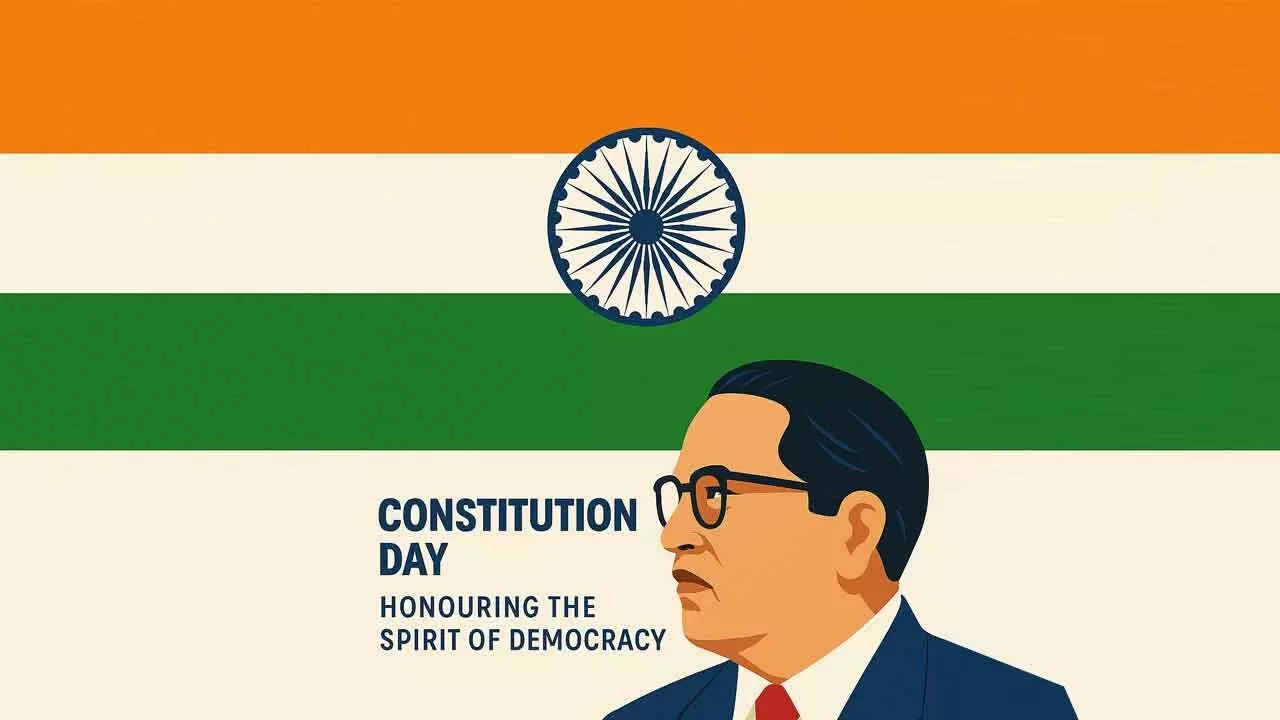The Constitution Stands Like a Flame; The Opposition Plays Discordant Notes
Constitution needs defenders not destroyers
The Constitution Stands Like a Flame; The Opposition Plays Discordant Notes

India celebrates Constitution Day to honour the vision, clarity, and courage that shaped the world’s largest democracy. But today, this celebration carries a deeper urgency, for the Constitution is being distorted—not by the government, but by an opposition trapped in negativity, confusion, and calculated divisiveness.
Instead of upholding constitutional values, opposition parties inject caste arithmetic, communal anxieties, and personal hatred into public discourse, polluting the democratic ecosystem far more than any environmental crisis. Their deliberate misinterpretation of secularism, their hostility to Sanatan traditions, and their willingness to ridicule or threaten institutions reveal an alarming disconnect from both constitutional spirit and national sentiment
From questioning the Prime Minister’s right to attend religious ceremonies to applauding toxic remarks against Sanatan Dharma, the opposition’s hypocrisy is stunning. They celebrate vote-bank rhetoric as “secular” while attacking every national institution—from EVMs to the judiciary—whenever reality does not favour them. Their refusal to introspect and their contempt for voters expose a deeper crisis: a leadership without vision, discipline, or faith in democracy.
This Constitution Day must, therefore, remind citizens that India’s stability rests on unity, duty, and truth—not on the opposition’s chaos, fakery, and divisiveness. The Constitution needs defenders who understand it, not destroyers who distort it
Constitution Day deserves to be celebrated by every Indian because it marks the birth of the nation’s democratic identity. On 26 November 1949, India adopted a constitution that transformed a newly independent country into a sovereign republic built on justice, liberty, equality, and fraternity. Honouring this day is not a ceremonial obligation—it is a civic duty. It reminds us of the visionary architects of our democracy, especially Dr B.R. Ambedkar, whose work continues to protect our freedoms and preserve our diversity.
But today, celebrating Constitution Day has become more urgent than ever. A toxic and confused opposition ecosystem is polluting public discourse, spreading division, and dragging national debate into the gutters of caste arithmetic, religious provocation, and manufactured outrage. Instead of empowering citizens with their Fundamental Rights and reminding them of their Fundamental Duties, the opposition seems determined to undermine the very constitutional spirit it claims to defend. Their negativity today is more suffocating than the nation’s air pollution.
At a time when India needs constructive opposition with vision and seriousness, what we witness instead is a leadership trapped in pettiness and personal hatred. Absurd commentary—like questioning whether the Prime Minister will live till 2047, or criticising his participation in the Ram Temple Dwajarohanam—exposes a deeper malaise.
The opposition’s argument that a Prime Minister cannot participate in a religious ceremony because India is “secular” reveals an embarrassingly shallow understanding of the Constitution. If such juvenile reasoning is the basis of their politics, one wonders whether they expect immortality for themselves while questioning others’ longevity.
This misinterpretation of secularism is not new; it began with Jawaharlal Nehru’s objection to President Rajendra Prasad attending the Somnath Temple consecration. Indian secularism never meant hostility to Hindu traditions—it meant equal respect for all faiths.
Articles 25 to 28 are crystal clear: every citizen has the freedom to profess, practise, and propagate religion. The State has no official religion, but neither does it forbid the personal faith of elected representatives.
Yet the opposition’s hypocrisy is staggering. They see no problem when the Telangana Chief Minister A Revanth Reddy publicly declares that “Congress equals Muslims and Muslims equal Congress.” Such naked communal positioning is apparently “secular” in their vocabulary. But the moment Modi presses a button for Dwajarohanam at the Ram Temple, they behave as if the Constitution has been violated. Their double standards are shameless.
Worse, they inject caste into every discussion. Leaders who never cared to visit the Ram Temple ever since it was consecrated about two years back and did not participate in the completion function though invited are questioning why a tribal or Dalit was not chosen for the ceremony—revealing their opportunism, not their concern for representation.
Their contempt for Sanatan Dharma is no secret; they applaud statements like Udhayanidhi Stalin’s comparison of Sanatan Dharma to “dengue and AIDS,” and support his statement that they will eradicate it. This is the opposition’s understanding of secularism: mock Hindu traditions, appease imaginary vote banks (Muslims in Bihar elections made it clear that they vote according to their conscience and cannot be considered as vote banks) and then hide behind selective constitutional morality.
This polluted ecosystem is emboldened further when urban Naxal elements are celebrated at protests, as seen recently when agitators praised the dreaded Maoist Hidma under the pretext of an air-pollution rally. Even elected leaders behave irresponsibly—such as West Bengal Chief Minister Mamata Banerjee threatening that she will “shake India” if opposed. Is this constitutional behaviour? Is this democratic maturity? These repeated outbursts show a frightening disregard for constitutional duties, institutional respect, and democratic restraint.
The truth is simple: many opposition leaders today have no faith in democracy, no respect for institutions, and no trust in voters. Their default response to every defeat is to attack EVMs, blame institutions, or insult the electorate itself. Instead of introspection, they peddle conspiracy theories. Instead of offering vision, they offer venom. If they continue placing dynasty before nation and appeasement before development, they are hastening their own irrelevance—much to India’s misfortune, because democracy deserves a responsible opposition.
This is why Constitution Day must be celebrated with seriousness and commitment. The Constitution is not under threat from the government, it is under threat from those who distort it for political survival. If the opposition believes caste arithmetic and religious appeasement will win them power, they are trapped in a dangerous illusion.
Constitution Day is a reminder that India’s future cannot be shaped by toxicity, fakery, or divisiveness- but by unity, duty, democracy, and truth.
(The author is a former Chief Editor at The Hans India)

